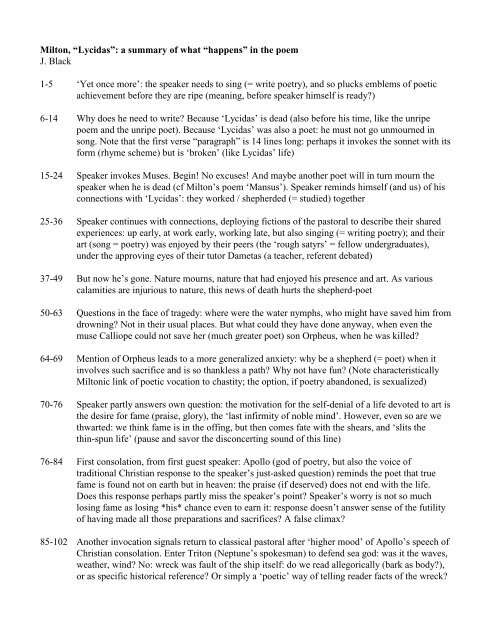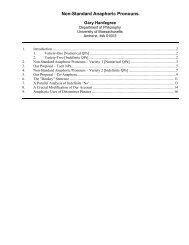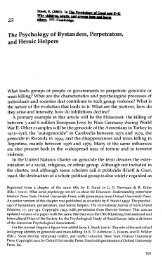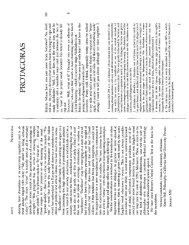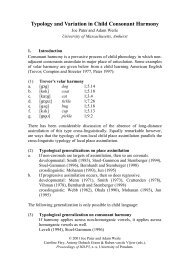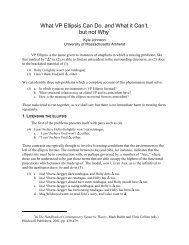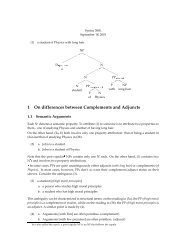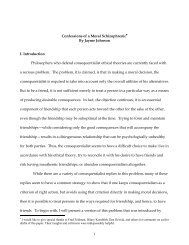Milton, “Lycidas”: a summary of what “happens” in the poem J. Black ...
Milton, “Lycidas”: a summary of what “happens” in the poem J. Black ...
Milton, “Lycidas”: a summary of what “happens” in the poem J. Black ...
Create successful ePaper yourself
Turn your PDF publications into a flip-book with our unique Google optimized e-Paper software.
<strong>Milton</strong>, <strong>“Lycidas”</strong>: a <strong>summary</strong> <strong>of</strong> <strong>what</strong> <strong>“happens”</strong> <strong>in</strong> <strong>the</strong> <strong>poem</strong><br />
J. <strong>Black</strong><br />
1-5 „Yet once more‟: <strong>the</strong> speaker needs to s<strong>in</strong>g (= write poetry), and so plucks emblems <strong>of</strong> poetic<br />
achievement before <strong>the</strong>y are ripe (mean<strong>in</strong>g, before speaker himself is ready?)<br />
6-14 Why does he need to write? Because „Lycidas‟ is dead (also before his time, like <strong>the</strong> unripe<br />
<strong>poem</strong> and <strong>the</strong> unripe poet). Because „Lycidas‟ was also a poet: he must not go unmourned <strong>in</strong><br />
song. Note that <strong>the</strong> first verse “paragraph” is 14 l<strong>in</strong>es long: perhaps it <strong>in</strong>vokes <strong>the</strong> sonnet with its<br />
form (rhyme scheme) but is „broken‟ (like Lycidas‟ life)<br />
15-24 Speaker <strong>in</strong>vokes Muses. Beg<strong>in</strong>! No excuses! And maybe ano<strong>the</strong>r poet will <strong>in</strong> turn mourn <strong>the</strong><br />
speaker when he is dead (cf <strong>Milton</strong>‟s <strong>poem</strong> „Mansus‟). Speaker rem<strong>in</strong>ds himself (and us) <strong>of</strong> his<br />
connections with „Lycidas‟: <strong>the</strong>y worked / shepherded (= studied) toge<strong>the</strong>r<br />
25-36 Speaker cont<strong>in</strong>ues with connections, deploy<strong>in</strong>g fictions <strong>of</strong> <strong>the</strong> pastoral to describe <strong>the</strong>ir shared<br />
experiences: up early, at work early, work<strong>in</strong>g late, but also s<strong>in</strong>g<strong>in</strong>g (= writ<strong>in</strong>g poetry); and <strong>the</strong>ir<br />
art (song = poetry) was enjoyed by <strong>the</strong>ir peers (<strong>the</strong> „rough satyrs‟ = fellow undergraduates),<br />
under <strong>the</strong> approv<strong>in</strong>g eyes <strong>of</strong> <strong>the</strong>ir tutor Dametas (a teacher, referent debated)<br />
37-49 But now he‟s gone. Nature mourns, nature that had enjoyed his presence and art. As various<br />
calamities are <strong>in</strong>jurious to nature, this news <strong>of</strong> death hurts <strong>the</strong> shepherd-poet<br />
50-63 Questions <strong>in</strong> <strong>the</strong> face <strong>of</strong> tragedy: where were <strong>the</strong> water nymphs, who might have saved him from<br />
drown<strong>in</strong>g? Not <strong>in</strong> <strong>the</strong>ir usual places. But <strong>what</strong> could <strong>the</strong>y have done anyway, when even <strong>the</strong><br />
muse Calliope could not save her (much greater poet) son Orpheus, when he was killed?<br />
64-69 Mention <strong>of</strong> Orpheus leads to a more generalized anxiety: why be a shepherd (= poet) when it<br />
<strong>in</strong>volves such sacrifice and is so thankless a path? Why not have fun? (Note characteristically<br />
<strong>Milton</strong>ic l<strong>in</strong>k <strong>of</strong> poetic vocation to chastity; <strong>the</strong> option, if poetry abandoned, is sexualized)<br />
70-76 Speaker partly answers own question: <strong>the</strong> motivation for <strong>the</strong> self-denial <strong>of</strong> a life devoted to art is<br />
<strong>the</strong> desire for fame (praise, glory), <strong>the</strong> „last <strong>in</strong>firmity <strong>of</strong> noble m<strong>in</strong>d‟. However, even so are we<br />
thwarted: we th<strong>in</strong>k fame is <strong>in</strong> <strong>the</strong> <strong>of</strong>f<strong>in</strong>g, but <strong>the</strong>n comes fate with <strong>the</strong> shears, and „slits <strong>the</strong><br />
th<strong>in</strong>-spun life‟ (pause and savor <strong>the</strong> disconcert<strong>in</strong>g sound <strong>of</strong> this l<strong>in</strong>e)<br />
76-84 First consolation, from first guest speaker: Apollo (god <strong>of</strong> poetry, but also <strong>the</strong> voice <strong>of</strong><br />
traditional Christian response to <strong>the</strong> speaker‟s just-asked question) rem<strong>in</strong>ds <strong>the</strong> poet that true<br />
fame is found not on earth but <strong>in</strong> heaven: <strong>the</strong> praise (if deserved) does not end with <strong>the</strong> life.<br />
Does this response perhaps partly miss <strong>the</strong> speaker‟s po<strong>in</strong>t? Speaker‟s worry is not so much<br />
los<strong>in</strong>g fame as los<strong>in</strong>g *his* chance even to earn it: response doesn‟t answer sense <strong>of</strong> <strong>the</strong> futility<br />
<strong>of</strong> hav<strong>in</strong>g made all those preparations and sacrifices? A false climax?<br />
85-102 Ano<strong>the</strong>r <strong>in</strong>vocation signals return to classical pastoral after „higher mood‟ <strong>of</strong> Apollo‟s speech <strong>of</strong><br />
Christian consolation. Enter Triton (Neptune‟s spokesman) to defend sea god: was it <strong>the</strong> waves,<br />
wea<strong>the</strong>r, w<strong>in</strong>d? No: wreck was fault <strong>of</strong> <strong>the</strong> ship itself: do we read allegorically (bark as body?),<br />
or as specific historical reference? Or simply a „poetic‟ way <strong>of</strong> tell<strong>in</strong>g reader facts <strong>of</strong> <strong>the</strong> wreck?
103-07 Enter Camus, personification <strong>of</strong> Cambridge University, to mourn his „dearest pledge‟<br />
108-31 Enter St Peter, with keys and mitre (headwear that emblematizes his role as bishop), mourn<strong>in</strong>g<br />
untimely loss <strong>of</strong> young m<strong>in</strong>ister (some argue that this figure is Christ, but <strong>the</strong> implicitly cited<br />
biblical passages fit Peter better. Fur<strong>the</strong>rmore, Triton speaks on behalf <strong>of</strong> Neptune as Peter<br />
himself is agent <strong>of</strong> a greater power). He bemoans current state <strong>of</strong> <strong>the</strong> m<strong>in</strong>istry, us<strong>in</strong>g „pastoral‟<br />
imagery: greedy wolves (clerics) pretend to be pastors, are „bl<strong>in</strong>d mouths‟ („bishop‟<br />
etymologically is „one who sees‟), write terrible poetry (note sound <strong>of</strong> verse); <strong>the</strong>ir sheep go<br />
unfed. And <strong>the</strong> big bad wolf (= Catholicism: <strong>the</strong> Jesuit order had wolves on its coat <strong>of</strong> arms)<br />
lurks unreproved („noth<strong>in</strong>g said‟ here; „little said‟ <strong>in</strong> <strong>Milton</strong>‟s manuscript). <strong>Milton</strong> foregrounds<br />
this passage <strong>in</strong> his headnote to <strong>the</strong> 1645 pr<strong>in</strong>t<strong>in</strong>g. The „two-handed eng<strong>in</strong>e‟ is a famous crux:<br />
usually <strong>in</strong>terpreted as a sword, as <strong>in</strong> Revelation (= word <strong>of</strong> God); or Michael‟s <strong>in</strong> PL.<br />
132-53 Return to (Sicilian, Theocritan) pastoral after <strong>in</strong>trusion <strong>of</strong> a different poetic register: note how<br />
pastoral mode is a vehicle for political and religious commentary. Return br<strong>in</strong>gs affirmation <strong>of</strong><br />
life and beauty: throw your flowers (= poetic tropes) on his grave. Read aloud <strong>the</strong> lovely list <strong>of</strong><br />
flowers, and note <strong>the</strong> beautiful, solitary (poetically) „glow<strong>in</strong>g violet‟. All this though is a<br />
pretense, because <strong>the</strong> body is gone, <strong>the</strong>re is no hearse. (And also because flowers do not mourn:<br />
nature is neutral? Calls attention to poetic fiction?)<br />
154-64 No body, because his body is washed north (Hebrides), or south (Cornwall); look homeward<br />
angel (Michael, on mount) and take pity; and dolph<strong>in</strong>s, br<strong>in</strong>g him home<br />
165-85 F<strong>in</strong>al, Christian consolation: weep no more, because „Lycidas‟ is dead, but not dead: he will rise<br />
to heaven, his body washed; he will hear <strong>the</strong> nuptial song (<strong>in</strong> Christian devotional metaphor, we<br />
collectively are <strong>the</strong> „bride‟ <strong>of</strong> Christ). Sa<strong>in</strong>ts <strong>the</strong>re s<strong>in</strong>g to him, console him: „Lycidas‟ is now a<br />
local deity, not mourned, but celebrated, will do good to o<strong>the</strong>rs.<br />
186-93 Back to frame narrative: <strong>the</strong> fate <strong>of</strong> „Lycidas‟ is now settled: <strong>what</strong> about speaker? We pan back,<br />
hear him s<strong>in</strong>g<strong>in</strong>g his pastoral song, all day. Sun is now sett<strong>in</strong>g; he twitches his mantle blue (<strong>the</strong><br />
color <strong>of</strong> hope), tomorrow to fresh woods, and pastures new. What are <strong>the</strong>se pastures? You might<br />
want to th<strong>in</strong>k about <strong>the</strong> implications <strong>of</strong> poetic form: <strong>the</strong> f<strong>in</strong>al eight l<strong>in</strong>es are <strong>in</strong> „ottava rima‟, <strong>the</strong><br />
dom<strong>in</strong>ant form <strong>of</strong> epic narrative verse <strong>in</strong> <strong>the</strong> Renaissance, used by Ariosto <strong>in</strong> Orlando Furioso,<br />
Tasso <strong>in</strong> Jerusalem Delivered, Camoens <strong>in</strong> Os Lusiads, and <strong>in</strong> English translations <strong>of</strong> epic<br />
narrative <strong>poem</strong>s (also, for that matter, by Byron <strong>in</strong> Don Juan, Shelley <strong>in</strong> „Witch <strong>of</strong> Atlas‟, and<br />
Yeats <strong>in</strong> „Among School Children‟ and „Sail<strong>in</strong>g to Byzantium‟). What might this mean?<br />
General questions to ponder:<br />
1) <strong>“Lycidas”</strong> is probably <strong>the</strong> most famous “pastoral elegy” <strong>in</strong> English literature. What conventions or<br />
expectations come to m<strong>in</strong>d when you hear <strong>the</strong> words “pastoral” and “elegy”?<br />
2) Many people f<strong>in</strong>d <strong>the</strong> essential artifice <strong>of</strong> <strong>the</strong> pastoral mode <strong>in</strong>s<strong>in</strong>cere, irritat<strong>in</strong>g, hard to stomach (cf.<br />
Samuel Johnson). But do we still produce and <strong>in</strong> fact enjoy “pastoral” art? (You might want to f<strong>in</strong>d a<br />
def<strong>in</strong>ition <strong>of</strong> “pastoral” onl<strong>in</strong>e, or <strong>in</strong> a book <strong>of</strong> literary terms). Th<strong>in</strong>k <strong>of</strong> possible examples.<br />
3) As an elegy, <strong>“Lycidas”</strong> ostensibly is about a young man who drowned. But is that <strong>what</strong> <strong>the</strong> <strong>poem</strong><br />
seems to be really about? What (e.g.) does <strong>the</strong> <strong>poem</strong> tell us about <strong>the</strong> speaker?


